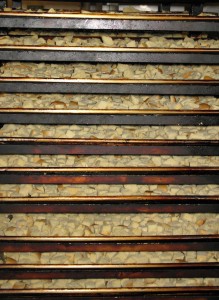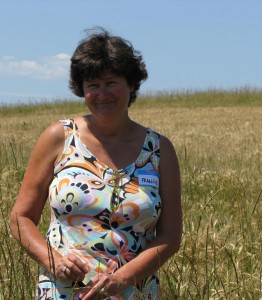 Blog post by Debra Heleba. Deb works for University of Vermont Extension where she is the Vermont SARE coordinator and also coordinates eOrganic’s dairy team. This blog post was reprinted with permission from the Women’s Agricultural Network (WAgN), a program of the University of Vermont Extension.
Blog post by Debra Heleba. Deb works for University of Vermont Extension where she is the Vermont SARE coordinator and also coordinates eOrganic’s dairy team. This blog post was reprinted with permission from the Women’s Agricultural Network (WAgN), a program of the University of Vermont Extension.
For many farmers, the road to value-added starts with good, abundant production of a commodity and the desire to increase farm revenues by adding value to that commodity through product development. For Francie Caccavo, owner of Olivia’s Croutons, the opposite was true. She started with a high-quality, value-added product and chose to grow a commodity (wheat) from a desire of building the ingredient stream of her product.
During a recent University of Vermont Extension Field Day, participants learned her story. Francie started Olivia’s Croutons in 1991 out of a desire to make a career switch that allowed her to work from home and keep flexible hours when her children were young (her daughter, the company’s namesake, was three years old, and her son, David was almost two). Back then, she made butter and garlic croutons in the family kitchen with bread purchased from Lilydale, a popular Burlington-area bakery. The business grew quickly that year; in five months, she was selling her croutons in about six stores, and purchased a convection oven and bread cutting machine to help keep up with orders. In two short years, they had outgrew the family kitchen and, in 1993, built a commercial kitchen in their basement.
The business continued to grow steadily—in 1997, a new packing machine was purchased; then they started to sell product through distributors, opening new markets and increasing demand; and in 1999, having outgrown their basement commercial kitchen, moved Olivia’s Croutons to commercial space in Hinesburg. The business outgrew this 2200 square foot space as well. The move to the bigger space had helped them further expand the business as well as shift to baking their own bread, led by David, Francie’s husband, when he left his “day job” to work full-time for the business.
It was son, David, that discovered the newest home for business and family in 2005–a farm in New Haven, complete with a 1912 barn that would house their crouton production operation. The barn, vacant since the 1950s, needed significant renovations but in seven short months, they had bought the farm, renovated the barn, and started operating in the new space in Autumn of 2006.

Croutons!
Two years later, they started growing their own wheat. Francie credits her neighbors, Earl and Alan Bessette, for their ongoing support to her as a new farmer. Today, Francie grows her winter wheat varieties (which have included Redeemer, AC Morley, and Jerry) in 2 to 18 acre plots in a 5-year crop
rotation. Neighbor Earl combines the wheat, and the grain is milled by Gleason Grains in Bridport. This homegrown flour accounts for about 20 percent (depending on the year’s crop production) of the flour used in the croutons. The move to growing her ingredient stream was important to Francie from both an economic standpoint as well as a commitment to high quality, local ingredients.
Francie markets Olivia’s Croutons throughout the United States; she has cruise and airline accounts, sells to several grocery chains, as well as several restaurants locally, in New York City, and beyond. Francie credits good employees, good neighbors, a supportive family, a high-quality, niche product, and an eye on cash flow for the continuing success of her business. Learn more about Olivia’s Croutons from their website and Facebook page.











